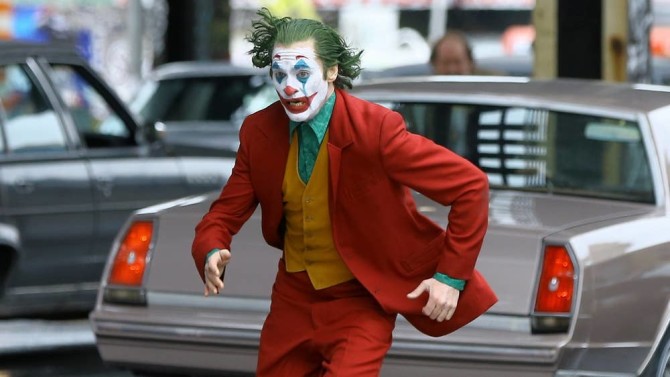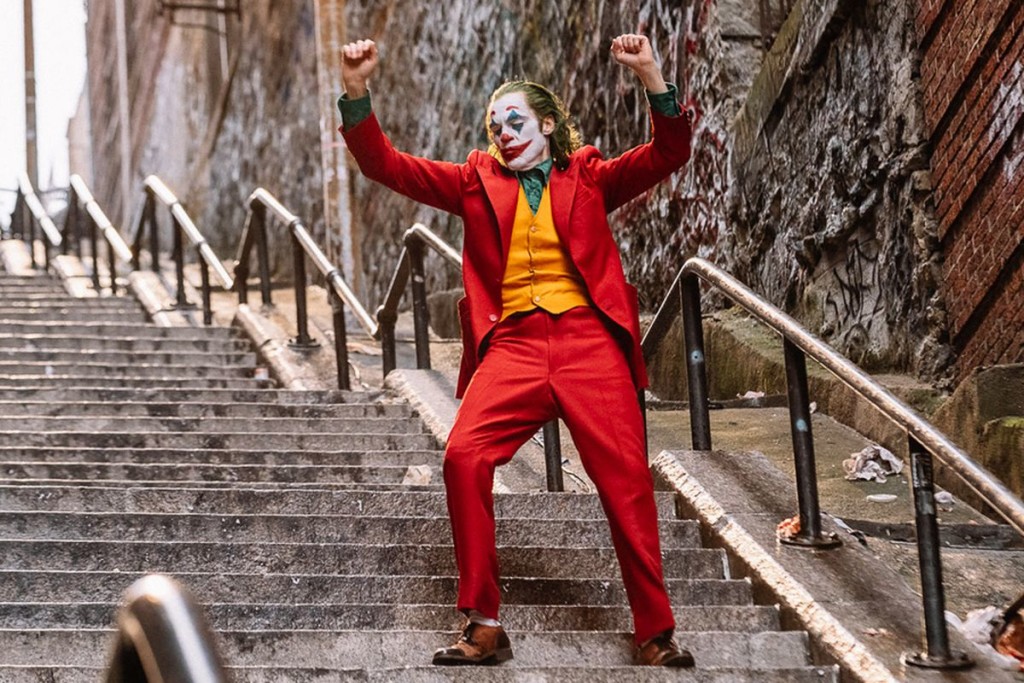Genre: Drama/Comic Book
Premise: The origin tale of Arthur Fleck, the man who would become the most famous villain of all time, the Joker.
About: Todd Phillips, the director of the Hangover movies, said he was sick of woke culture destroying comedy and wanted to try something different. Since there is no official origin story for the Joker, he thought it might be interesting to explore that. Warner Brothers was reluctant at first, but once they agreed, they went all in on it, despite the fact that they already had an actor, Jared Leto, playing the Joker. Joaquin Phoenix is said to have lost 50+ pounds for the role, but unlike previous actors’ traumatic experiences trying to embody the infamous character, Phoenix said playing him was “enjoyable.” The movie opened this weekend and made 94 million dollars domestically, making it the biggest opening in the history of October. If that doesn’t make you SMILE, what does?
Writers: Todd Phillips and Scott Silver
Details: 2 hours and 2 minutes
The media is having a hard time with this one.
They want to pigeonhole it or use it to push a hot-take political narrative. And yet, to their unending chagrin, nothing’s sticking. I think that’s because this movie is hard to categorize. It’s such a unicorn in that it doesn’t fit into any boxes. It’s a comic book movie. But it’s really a drama about mental illness. It’s a movie about laughter. But without any laughs. It tackles gun violence, and yet despite our best attempts to villainize Fleck’s actions, we think most of the people he killed deserved it.
That’s the big one for me because it represents just how powerful writing can be. We writers can make a mentally disturbed man murder people and make it feel like he was in the right. How messed up is that?
In case you didn’t read my review of this script, I loved it. It was a tick away from genius. And I was curious if they were going to stick with that draft for the shooting script. The answer is yes with the exception of a few changes.
First, Murray Franklin (Robert De Niro) doesn’t show up in the script until late. We see him on TV a few times. But we don’t meet him. And while this didn’t bother me, it was a little weird that this giant character involved in the film’s big climax isn’t formally introduced until late in the script. Phillips must’ve sensed this as well, so they added an Arthur dream sequence early on where he’s in Murray Franklin’s studio audience, and Murray invites him on stage and tells him how great he is. The scene was by no means necessary but they needed Murray in there earlier somehow, and that’s how they did it.
Another thing they did was improve the background storyline of the Joker-inspired city riots. Background storylines are always tricky. By their very nature, they happen in the background. A lot of times writers will depict these storylines through TV news segments – the old “Hey bartender, turn that up, will you!” and the bar quiets down as we see the latest news story about the serial killer on the loose.
But hearing a news guy say, “And the riots are getting worse!” doesn’t advance the storyline in an impactful way. So what you’re always trying to do as a screenwriter with these background stories is look for ways to intersect them with your main storyline. And that’s the change Phillips made in the shooting script.
In the original script, Joker just went to Murray’s show. But in the final film, he runs from some cops and stumbles onto a subway that’s filled with clown impersonators on their way to the big demonstration downtown. Now we’d heard on television that the demonstration was happening. But by intersecting Arthur’s personal story with the actual members of the demonstration, it made it more real. We now feel the riots, the demonstrations, because Arthur is in the middle of them.
But the biggest change they made was to the “love” story. In the script, the Sophie relationship was straight-forward. She was just being nice to someone who clearly had mental issues and he mistook that for her liking him. Late in the script, he goes to see her, finds her having sex with her boyfriend, is confused, and she tells him to get out of his apartment and never come near her again.
The movie takes that up a tic. Now, him and Sophie get in an actual relationship. She goes to his stand-up. She’s there with him for support when his mother is in the hospital. You’re kinda confused what she sees in him, but then the big “Sixth Sense” twist hits where we realize he was imagining being with her all those times. They’ve never been in a relationship at all.
This change made for a better movie but it looks like a change they made last-minute because they weren’t able to smooth it out enough. It never made sense, from the audience’s perspective, why she would be with him. He’s way too creepy and weird. Of course, she ISN’T with him. But that’s a cop out. You still have to sell the fake relationship to the audience. I think a lot of people came out of the movie saying they were glad that twist happened because, otherwise, it made zero sense why she was with him.
So let’s get down to it. What did I think of the movie compared to the script?
I didn’t like it as much.
And I’ll tell you why.
Joaquin Phoenix.
There’s something disturbing about Joaquin Phoenix. He’s a bizarre dude who delights in making people uncomfortable (watch any of his interviews to see this in action) and there were several times during his performance that I felt like he was way too self-indulgent. The random weird dancing sequences (not the cool stairs dance, but the alone in his underwear dance) got tiring. And in these moments, I saw Phoenix. I did not see Arthur Fleck.
It was the same reason I didn’t like that Jim Carrey movie, Man on the Moon. You were so aware that Carrey was being an insufferable nutball on set that you saw the insufferable nutball, not the character he was portraying. There were several times watching Joker where I thought, “These other people working with him must hate him.” I’ve even heard as much. Bryan Callen, who has a cool podcast called “The Fighter and the Kid” talked about his one scene with Phoenix and how the guy is the world’s most annoying human.
And yes, I’m aware I’m not supposed to judge this film on who Phoenix is in real life. But he’s kind of intertwined with this character to the point where you have to. I guess the best way to put is that I never saw Heath Ledger in The Dark Knight. But in “Joker,” I definitely saw Joaquin Phoenix. And that prevented me, at times, from enjoying the movie.
As for the story, it hit me harder than it did in the script. Something about the script made me feel safer. There was a tad more fun in it. But the movie, especially with the intense mental illness being displayed, made for a dark sad experience. I was emotionally DRAINED after this film. And this is the reason why I struggle to connect with these movies (tragedies) in general. They’re hard to watch. And afterward, I don’t want to put myself into that emotional blender again. It’s so sad how this person transforms into what he does. I thought that maybe because it was a comic book character, there would be a taste of entertainment to the story. But no. This was about a mentally deranged man becoming unhinged.
With that said, there’s so much greatness in this movie. I loved the killing of the coworker scene and the midget not being able to get out because of the chain lock. I loved the opening scene with the sign. Without that scene getting us to sympathize with Arthur, nothing else in this movie works. I loved the interaction between him and Bruce Wayne at the gate. I loved the seemingly innocuous scene where he asks the mental hospital clerk to look up his mom’s records. It was just a conversation and yet there was so much subtext to it – how at first the clerk thinks he’s normal, but the more he talks to him, the less sure he is, does he help him, does he not help him? I loved the dancing down the stairs scene. I loved the score, the cinematography, and the Joker’s final costume was amazing.
I remember when this film was announced and everybody said, “That’s the dumbest idea ever. You already have a Joker. Now you’re going to have a second one?” In a time of “everything Marvel does is right” and WB doing something that Marvel would never do, that brought them a lot of negativity. And yet they charged forward anyway.
They hitched their wagon to an unproven director in this genre. They made the darkest comic book movie ever. They made it R. Not fun Deadpool R. Sad/Angry R. I read a review where someone said that this is biggest risk a studio has taken since Fight Club and I agree. It’s so different from everything out there. And it would’ve been much easier for Warner Brothers to say no. But they gambled and it paid off. This movie is going to be remembered for a long time. I haven’t been able to stop thinking about it since Friday. And that rarely occurs these days. These studio movies are so formulaic you’ve forgotten them by the time you’ve validated your parking ticket.
Probably the best thing about this film is it’s going to remind studios to take more chances. It’s been a long time coming.
[ ] What the hell did I just watch?
[ ] wasn’t for me
[xx] worth the price of admission
[ ] impressive
[ ] genius
What I learned: Find ways to integrate your foreground story with your background story. Having nameless TV anchors talk about a plague sweeping across the globe isn’t enough. You must personally intersect your characters with the plague at some point. That may seem obvious. But a lesser writer would’ve kept all of the “riot-demonstration” storyline in Joker on TV inserts. Phillips knew we had to get Arthur into the middle of that at some point to really sell it.




